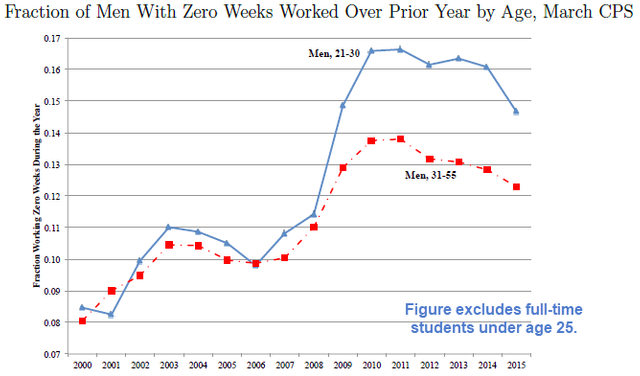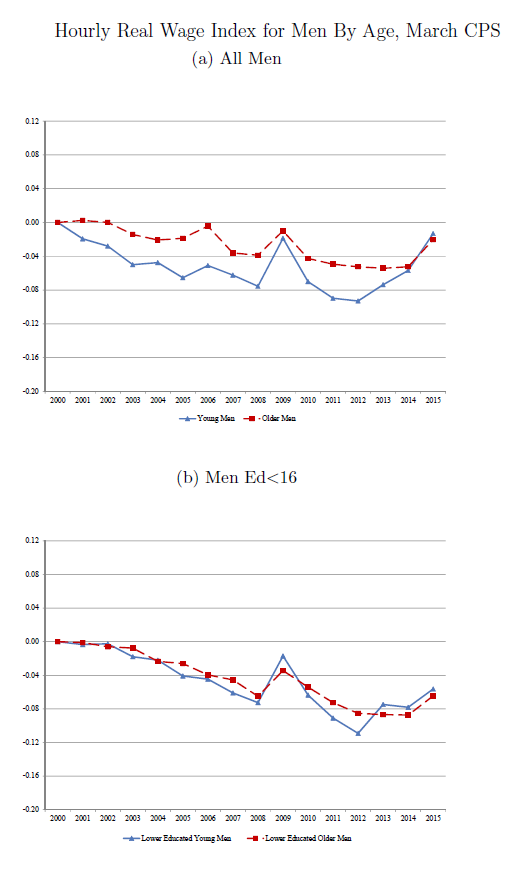Another Reason Men Don't Work: Imaginary World More Enjoyable Than The Real World
Authored by Mike Shedlock via MishTalk.com,
President Trump, like President Obama before him, point out the low unemployment rate as a measure of success.
What they don’t point out are masses of people on welfare via fraudulent disabilities, people in school wasting money in dead-end retraining exercises, people who have simply given up looking for a job, and people in forced retirement needing Social Security payments to survive.
A team of researchers from Princeton, the University of Chicago, and the University of Rochester discusses another class of individuals who are not working but are not counted as unemployed: People, primarily young men who are addicted to games. For such individuals, games provide a fantasy world that is far more enjoyable than the real world.
Please consider their report on Leisure Luxuries and the Labor Supply of Young Men.
Between 2000 and 2015, market hours worked fell by 203 hours per year (12 percent) for younger men ages 21-30, compared to a decline of 163 hours per year (8 percent) for men ages 31-55. These declines started prior to the Great Recession, accelerated sharply during the recession, and have rebounded only modestly since. We use a variety of data sources to document that the hours decline was particularly pronounced for younger men.
Not only have hours fallen, but there is a large and growing segment of this population that appears detached from the labor market: 15 percent of younger men, excluding full-time students, worked zero weeks over the prior year as of 2016. The comparable number in 2000 was only 8 percent.
A natural question is how these younger men support themselves given their decline in earnings. We document that 67 percent of non-employed younger men lived with a parent or close relative in 2015, compared to 46 percent in 2000.
One avenue to gauge how younger men perceive their fortunes is to use survey data on happiness. In this spirit, we complement the patterns in hours, wages, and consumption with data on life satisfaction from the General Social Survey. We find that younger men reported increased happiness during the 2000s, despite stagnant wages, declining employment rates and increased propensity to live with parents/relatives. This contrasts sharply with older men, whose satisfaction clearly fell, tracking their decline in employment.
Annual Hours and Employment Rates

Zero Weeks Worked

Real Wages

Two Questions
1. The study found gaming trends apply to younger men, not older men and not women.
Do women more than men like to live in the real world?
2. Is happiness a function of increased gaming or a reflection on changing attitudes of millennials in general towards material things?The research report ties in nicely with Growing Number of Companies Complain About Inability to Find Workers: So Why is Wage Growth So Low?
Source : http://www.zerohedge.com/news/2017-07-18/another-reason-men-dont-work-imaginary-world-more-enjoyable-real-world
Disclaimer : This is not the real Tyler Durden! I read ZeroHedge every day to find the one or two best articles and reformat them for Steemit. I appreciate the upvotes but consider following the account and resteeming the articles that you think deserve attention instead. Thank you!Head over to ZeroHedge.com for more news about cryptocurrency, politics and the economy.
True. While testing out our Warcraft traffic acquisition strategy several years ago a number of my friends noticed that there was an overwhelming number of 20something year old guys online during the day. Seemed like they were replacing the inability to realize their ambitions in real life with the mediocre ability to realize their ambitions in game. I say mediocre since most were shit raiders.
Yes. Women more than men like to live in the real wolrd.
We just have to do it=)
Good to have mirrowing of zerohedge on steemit. Always refreshing
why don't you ask your father?